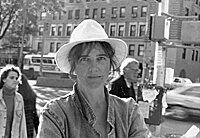I believe Howard’s End is E. M. Forster’s compassionate attempt to understand heterosexual life. You know the drill.
1. Life is for the acquisition and retention of property. 2. Family is the mechanism God invented to facilitate that purpose. 3. Single women should marry. 4. A son covers a multitude of sins.
This is the same world David Lean showed us in Brief Encounter. Repression everywhere; happiness nowhere.
Of all James Ivory’s examinations of marriage (including The Householder, Quartet, Mr. and Mrs. Bridge, Surviving Picasso, The Golden Bowl) this one is the bleakest. Mrs. Bridge ’s near death experience was just a close call, but the (much desired) house in Howard’s End actually succeeds in killing one of the characters.
Everything you need to support the argument that James Ivory is a feminist can be seen both within the film, and in the intensely collaborative working relationships Ivory had with his lead actress and his long time writing partner. Howard’s End was nominated for nine Oscars, including Best Picture and Best Director. It won two: Emma Thompson for Best Actress, Ruth Prawer Jhabvala for Best Screenplay.
This was Jhabvala’s fifteenth film with Ivory.
I hereby claim Howard’s End as an Oregon film, based on James Ivory’s contribution as director.




0 responses so far ↓
There are no comments yet...Kick things off by filling out the form below.
Leave a Comment